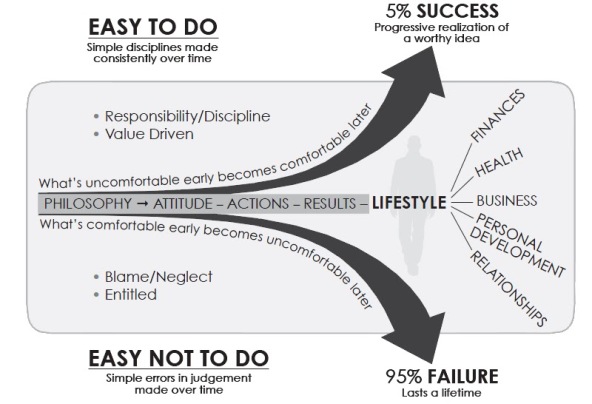- You are here:
- Home »
- Leadership »
- Seven Slight Edge Principles by Jeff Olson
Seven Slight Edge Principles by Jeff Olson

The Seven Slight Edge Principles by Jeff Olson can be used every day for your personal and business life. The things we do or don’t do every day move us closer or father away from our goals.
1. Show Up: Director Woody Allen said “80% of success is showing up.” Most people won’t take the steps to just get started then learn the skill necessary to follow-through and overcome the obstacles. Stop thinking about it get busy. Commit and show up.
2. Be Consistent: Consistency and showing up work together. Consistent effort over time produces results. How do you measure effectiveness if what you are measuring isn’t performed consistently? Be consistent.
3. Have a Good Attitude: Jim Rohn said; “Each of us has the ability to put our unique human potential into action and to acquire a desired result. But the one thing that determines the level of our potential—that produces the intensity of our activity and predicts the quality of the result we receive—is our attitude.” Enough said.
4. Be Committed for a Long Period of Time: Showing up, commitment and consistency is critical for long-term success in any venture. Jim Rohn also relates to the Biblical story, The Parable of the Sower. The sower committed to sowing seed regardless of the outcome. Keep sowing, sowing and sowing and you’ll eventually reap the harvest.
5. Have Faith and a Burning Desire: Napoleon Hill wrote; ‘There is one quality which one must possess to win, and that is definiteness of purpose, and the knowledge of what one wants, and a burning desire to possess it’. Most important be specific about what you want and write it down!
6. Be Willing to Pay the Price: Jeff Olson says, “Anything worth having is worth working and paying a price for.” Zig Zilar said; “You do not pay the price of success, you enjoy the price of success.” Following the Slight Edge Principles will keep you on track.
7. Practice Slight Edge Integrity: Integrity and character is demonstrated as by what you do when no one’s looking. Be true to yourself first. The compounding effect of the Slight Edge Principles works both ways. What’s easy to do is also easy not to do. Success is a compilation of small daily decisions. Missing a day or two or three might go unnoticed for a while but the compounding effect of good and bad decisions eventually work for you or against you.
